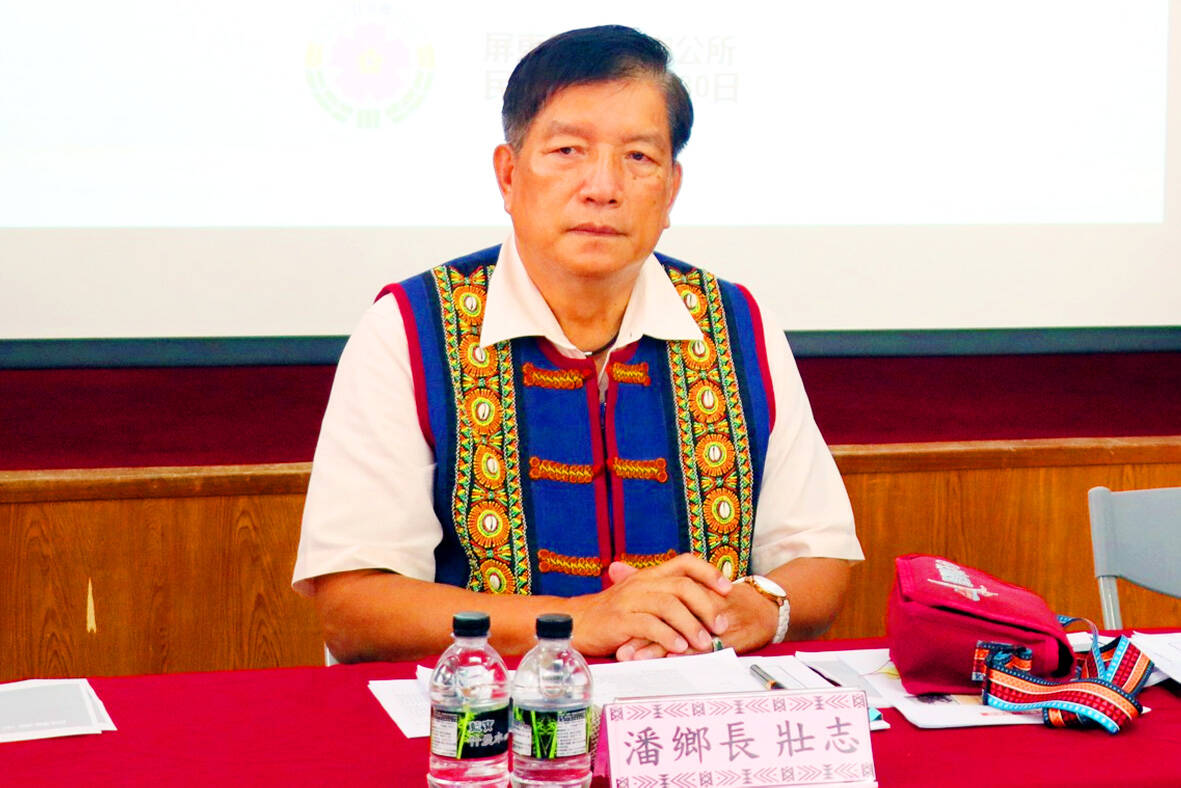The skulls of four Paiwan warriors that were taken by the Japanese during an 1874 punitive expedition known as the Mudan Incident and which are currently housed at Edinburgh University in Scotland are soon to be returned to Taiwan, the Mudan Township Office said.
In a statement yesterday, the office said that according to historical records, the skulls of 12 Paiwan warriors were taken from the Shimen battlefield in Pingtung County by the Japanese in 1874 and taken to Japan and the US.
Four of the skulls eventually ended up in the collection of Edinburgh University, which has indicated in recent years that it would be willing to return them, the office said.

Photo: Taipei Times
Following a series of meetings between local Paiwan groups and the Council of Indigenous Peoples, a delegation including Mudan Township (牡丹) Mayor Pan Chuang-chih (潘壯志), tribal and spiritual leaders, and historians traveled to the UK to inspect the skulls, and a traditional ceremony to mark their return is now being planned, the office said.
A person with knowledge of the matter, but who wished to remain anonymous, said the four skulls were expected to be returned to Taiwan on Sunday.
After their arrival, they are to be sent to the Tainan branch of the National Museum of Prehistory for DNA profiling so that more information about their identities can be discovered, the source said.
The Mudan Incident refers to an 1874 punitive expedition launched by the Japanese in response to the massacre of 54 shipwrecked Ryukyuan sailors by Paiwan warriors three years earlier.
After a major battle with the Paiwan at Shimen in today’s Mudan Township, the Japanese gained the upper hand in the fighting and the Paiwan retreated to the mountains to fight a guerrilla war.
After many Japanese soldiers began coming down with illnesses in the unfamiliar climate, the two sides agreed to a ceasefire and the war came to an end.
The Shimen battlefield site now hosts a memorial park.

Alain Robert, known as the "French Spider-Man," praised Alex Honnold as exceptionally well-prepared after the US climber completed a free solo ascent of Taipei 101 yesterday. Robert said Honnold's ascent of the 508m-tall skyscraper in just more than one-and-a-half hours without using safety ropes or equipment was a remarkable achievement. "This is my life," he said in an interview conducted in French, adding that he liked the feeling of being "on the edge of danger." The 63-year-old Frenchman climbed Taipei 101 using ropes in December 2004, taking about four hours to reach the top. On a one-to-10 scale of difficulty, Robert said Taipei 101

Taiwanese and US defense groups are collaborating to introduce deployable, semi-autonomous manufacturing systems for drones and components in a boost to the nation’s supply chain resilience. Taiwan’s G-Tech Optroelectronics Corp subsidiary GTOC and the US’ Aerkomm Inc on Friday announced an agreement with fellow US-based Firestorm Lab to adopt the latter’s xCell, a technology featuring 3D printers fitted in 6.1m container units. The systems enable aerial platforms and parts to be produced in high volumes from dispersed nodes capable of rapid redeployment, to minimize the risk of enemy strikes and to meet field requirements, they said. Firestorm chief technology officer Ian Muceus said

MORE FALL: An investigation into one of Xi’s key cronies, part of a broader ‘anti-corruption’ drive, indicates that he might have a deep distrust in the military, an expert said China’s latest military purge underscores systemic risks in its shift from collective leadership to sole rule under Chinese President Xi Jinping (習近平), and could disrupt its chain of command and military capabilities, a national security official said yesterday. If decisionmaking within the Chinese Communist Party has become “irrational” under one-man rule, the Taiwan Strait and the regional situation must be approached with extreme caution, given unforeseen risks, they added. The anonymous official made the remarks as China’s Central Military Commission Vice Chairman Zhang Youxia (張又俠) and Joint Staff Department Chief of Staff Liu Zhenli (劉振立) were reportedly being investigated for suspected “serious

American climber Alex Honnold is to attempt a free climb of Taipei 101 today at 9am, with traffic closures around the skyscraper. To accommodate the climb attempt and filming, the Taipei Department of Transportation said traffic controls would be enforced around the Taipei 101 area. If weather conditions delay the climb, the restrictions would be pushed back to tomorrow. Traffic controls would be in place today from 7am to 11am around the Taipei 101 area, the department said. Songzhi Road would be fully closed in both directions between Songlian Road and Xinyi Road Sec 5, it said, adding that bidirectional traffic controls would